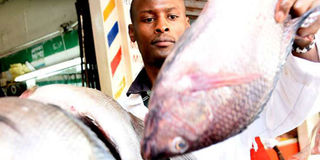State: More fish imports due to rise in consumption

A vendor stacks fish for sale. Outgoing Fisheries PS Micheni Ntiba says fish eating has increased in the last nine years. FILE PHOTO | NMG
What you need to know:
- In 2009, a person ate an average of one kilogramme of fish annually.
- In a few years this has grown to 4.5kg per person per year meaning that more Kenyans are now looking for fish as food than was before which has created a big gap in the market.
- The government has put in place measures that will see foreign fishermen lawfully restricted from entering the Kenyan sea borders.
The government has linked increased fish consumption to rising importation of the commodity.
Outgoing Fisheries PS Micheni Ntiba who has been moved to University Education and Research docket said fish eating has increased in the last nine years.
“In 2009, a person ate an average of one kilogramme of fish annually,” he said.
“But in a few years this has grown to 4.5kg per person per year meaning that more Kenyans are now looking for fish as food than was before which has created a big gap in the market,” said Prof Ntiba.
He said there is a huge fish gap vis-a-vis the consumption level. He said if the country does not produce enough fish it will continue to buy from outside.
“Fish is a commodity for trade. Nationally we produce about 130, 000 metric tonnes of fish. We are not importing so much fish. We are only importing 37, 000 metric tonnes but we expect that the country should produce fish,” he said.
His remarks comes three days after Industrialisation and Enterprise Development CS Adan Mohamed defended fish imports from China, saying the country only imports to fill the gap in supply.
Mr Mohamed said fish from China has been flooding the Kenyan market because the country does not produce enough fish to satisfy demand. But traders have complained that cheap fish imports are ruining their business.
Prof Ntiba said there is need for the country to be involved in aquaculture to address the shortage.
“We have discussed with the importance of having investment in the sea particularly to exploit unexploited resources in the Indian Ocean,” he said.
He added that aquaculture will enable the country to have new fish and in the short term it will be able to give the country more than 100,000 tonnes annually.
He said: “In the medium time moving forward we will be having over 470,000 metric tonnes and in the longer term we are seeing that the aquaculture both on land and in the sea will give the country over one million metric tonnes of fish per year.”
He said the government has put in place measures that will see foreign fishermen lawfully restricted from entering the Kenyan sea borders.
“We have already completed the construction of fisheries control and surveillance centre in Liwatoni.
“We have put a lot of resources in surveillance, monitoring and patrol to ensure that those who come to fish in our sea go through our port so we benefit,” he said.




